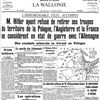National Content: Belgium
An irremediable disaster has happened. As M. Hitler has refused to retire his troops from the Pole territory, United Kingdom and France consider themselves in state of war with Germany.
| Source | « La Wallonie » n°247, the 4th of September 1939, P. 1, 3, 4. |
| Event referred to | September 1st,1939 : Nazi’s invasion of Poland |
| Technological characteristics | Type of file: Image Extension : pdf Characteristics Dimension of the files: <2000 Ko Availability proposed: pdf document with zoom options |
| Description of the source | Kind of source: Daily newspaper Origin of the source: Archives of the University of Liège (Belgium) Language: French Copyright issues: full availability |
| Contextualisation of the source | « La Wallonie » is a French-speaking newspaper. Started in 1919, this daily paper of left socialist and syndicalist trend is edited in Liege. It is the property of the General Federation of the Belgian Workers (FGTB) and more particularly of the Provincial Federation of the Metalworkers. It is mostly read by the popular class. In 1969, 80.000 copies were daily printed. (J. GOL, Le monde de la presse en Belgique, édition du Centre de Recherche et d’Information socio-politiques – CRISP- 1970) |
| Interpretation of the source | In the subtitled article “To our readers - The regime of information”, “La Wallonie” declares it will strive to check information whereas other newspapers will publish the information received from the different press agencies just as it is, in order to pay great attention to neutrality. Moreover, the question of neutrality is put in the article of page 3 “In front of the crime”. Extracts of Hitler’s speech to the German people are published, but with a not very laudatory title “ The oratorical delirium of M. Hitler” (page 4) |
| Original Contents | La qualité de l’information est une préoccupation de la rédaction du journal :« (…)la nouvelle, si elle était donnée simplement avec l’indication de source, sans réserve d’aucune sorte, déterminerait chez les lecteurs une opinion ou un jugement sans base objective. Ce n’est pas, à notre sens, la neutralité que nous devons observer mais l’objectivité la plus nette et la plus claire ». La neutralité politique est également critiquée : « L’attitude de la France et de l’Angleterre sont suivies partout avec une sympathie enthousiaste (…) On fait des vœux pour le succès de leur entreprise. Mais on ne s’y associe pas !» Les motifs invoqués pour justifier la neutralité sont présentés ironiquement et l’auteur Louis de Brouckère conclut « Serez-vous neutre devant le crime ? » |
| Original Contents (English Translation) |


